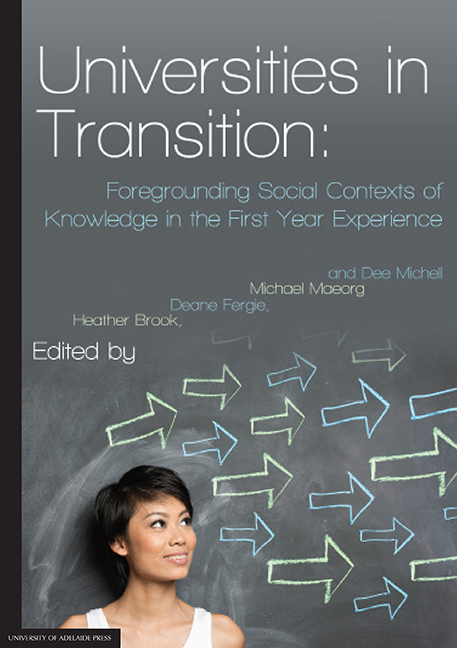Book contents
- Frontmatter
- Contents
- Notes on Contributors
- Introduction
- Part 1 Reconceptualising: transition and universities
- Part 2 Revaluing: ‘non-traditional’ student groups in higher education
- 3 Classism on campus? Exploring and extending understandings of social class in the contemporary higher education debate
- 4 Reframing ‘the problem’: students from low socio-economic status backgrounds transitioning to university
- 5 Changing social relations in higher education: the first-year international student and the ‘Chinese learner’ in Australia
- 6 Relating experiences: Regional and Remote students in their first year at university
- Part 3 Realising: transformations on campus
5 - Changing social relations in higher education: the first-year international student and the ‘Chinese learner’ in Australia
from Part 2 - Revaluing: ‘non-traditional’ student groups in higher education
Published online by Cambridge University Press: 05 December 2014
- Frontmatter
- Contents
- Notes on Contributors
- Introduction
- Part 1 Reconceptualising: transition and universities
- Part 2 Revaluing: ‘non-traditional’ student groups in higher education
- 3 Classism on campus? Exploring and extending understandings of social class in the contemporary higher education debate
- 4 Reframing ‘the problem’: students from low socio-economic status backgrounds transitioning to university
- 5 Changing social relations in higher education: the first-year international student and the ‘Chinese learner’ in Australia
- 6 Relating experiences: Regional and Remote students in their first year at university
- Part 3 Realising: transformations on campus
Summary
Abstract
Throughout history, human movements beyond borders — geographical, cultural, intellectual or otherwise — have narrowed the distances between peoples and expanded their horizons. Border crossings and the physical annihilation of space enable peoples to interact and learn from one another and consequently alter the relationships between those involved (Dewey, 1993). Globalisation in higher education has created one of the most momentous border crossings in Australia's history; it has not only changed the face of students' population in Australia, but also transformed the social relations between university policymakers, academics and students. This chapter examines the effects of changing social relations in Australian higher education where first-year international students are concerned. In the context of students' diversity, the chapter seeks to question the appropriateness of essentialising and teaching a particular type of ‘critical thinking’ that erases the cultural borders these students have crossed. It engages with the ongoing debates on negotiating identities in the globalising university ‘contact zone’ (Kenway and Bullen, 2003), and attempts to demystify certain characteristics of the ‘Chinese learner’. Taking up the theoretical concept of a ‘social imaginary’ advanced by Rizvi and Lingard (2010), this chapter argues for an alternative imaginary to conceptualise the identities of international students in higher education. It advocates a Confucian educational paradigm that regards everyone, irrespective of where they come from, as educable and having the right of equal access to quality education.
- Type
- Chapter
- Information
- Universities in TransitionForegrounding Social Contexts of Knowledge in the First Year Experience, pp. 127 - 156Publisher: The University of Adelaide PressPrint publication year: 2014

